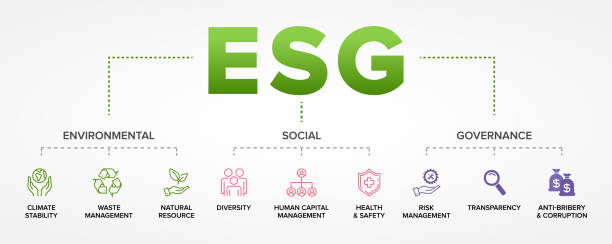Executive Pay is Now Being Linked to ESG Goals
The contemporary issue in corporate governance circles is the company’s commitment to, and pursuit of ESG initiatives.
Companies are becoming increasingly involved with environmental, social, and governance initiatives.
Corporate governance today consists of not only chasing profits but also investing in environmental, social, and governance (ESG) initiatives.
This involves businesses pursuing ESG initiatives, which also tend to provide as much profit as other business models. Thus, ensuring that the environment is taken care of and that employees are treated well.
ESG goals are becoming more important to companies, but there is a debate surrounding how to motivate leaders to pursue these leads.
Increasingly, companies have come to link executive pay with sustainability performance
There are pros and cons to tying executives’ pay to ESG performance. Some people say that incentives do not work but there is a growing movement in favour of this approach
This is based on the idea that if executives are well-paid, they will have the necessary means to pursue sustainable aims (ESG performance).
For example, employees who see their boss do the same will be more likely to take an approach similar to theirs. There are also those, who do not advocate for this measure
Therefore, this article examines the economic significance of sustainability-based pay arrangements in comparison to conventional ones.
What is an ESG Goal?

An ESG goal is a type of sustainability goal that focuses on the environmental, social and governance aspects of an organization.
ESG is a broad term and has been used to describe the different ways that companies are trying to become more sustainable. It encompasses the environmental, social, and governance aspects of a business.
These goals assess a company’s impact on the environment, society, and governance which are vital for investors to assess because ESG relates to financial performance, which impacts investment decisions.
ESG goals are often measured in ESG metrics, which are used to measure how well a company’s practices align with its stated goals. This offers companies the opportunity to be rated on their sustainability performance.
In this way, ESG goals can be used to measure the success of an organization in these three areas.
Pursuing these goals requires additional due diligence to assess a company’s sustainability performance in the three sustainability areas via environmental sustainability (e.g. greenhouse gas emissions); social sustainability (e.g. labor rights, philanthropic giving); and economic sustainability (e.g. return on assets, debt levels, financial risk).
Because sustainability includes these three areas of impact it makes sense that there would be an interest in using ESG as an indicator of sustainable performance.
What are the benefits of using ESG as a metric for sustainable performance?
Including sustainability metrics in company assessment and performance, reporting allows companies to see how they compare with other companies in their industry with regard to both conventional financial metrics and sustainability metrics.
Additionally, allow investors to see which companies are leading on sustainability as well as what specific policies these leaders have employed.
Moreover, the sustainability can be used to assess the impact of a particular stock on society, which is useful for investors who are interested in social impact investing.
The Trend of ESG and Executive Pay and How it Impacts Your Business

Executive compensation is not just about how much a company pays its executives. It is also about how these executives are paid and what they are paid for.
This has been the case for some time, but now it is becoming more apparent that sustainability goals are being linked to executive pay as well. The purpose of this paper is to explore the current state of executive compensation in relation to ESG goals and sustainability goals.
Executive pay and sustainability strategy are two terms that are often used in the same sentence. ESG, or environmental, social and governance, is a strategy that many companies use to measure their performance in terms of sustainability.
In recent years, there has been an increased focus on sustainability goals as they have become more relevant to the success of a company. Early ESG measures were limited to environmental and social impact and only recently have sustainability-financial metrics emerged.
In the last decade, there has been significant progress in understanding both how investors are investing as well as in improving sustainability performance. There’s a need for a focus on the sources of sustainable profit generation and where other types of capital should be allocated, such as green bonds.
The trend of sustainability and executive pay is one that should be considered when developing your business strategy.
Do we know if current trends in ESG issues can really predict future company performance?
Company execs will now have another thing to focus on when it comes to determining how much they get paid.
Business executives will now have to think about the impacts their companies have on society, not just how well they do financially.
Thus, executives’ compensation may get slightly smaller for companies with a bad ESG index.
Shareholder returns and financial performance have traditionally been the focus of company executives.
However, in recent years, some executives have been rewarded for sustainability goals and that’s a good thing. For instance, between 5-15% of their total pay could be dictated by these objectives.
The SEC’s development of an ESG standard with increased investor attention on sustainability as a component of executive compensation could accelerate the trend of linking executive compensation to sustainability performance.
The Securities and Exchange Commission (SEC) is looking at various regulations relating to environmental, social, and governance (ESG) factors as well as a rule about executive compensation that is being finalized in the year 2022.
It is now a common trend that more and more companies have become environmentally conscious. A lot of this has to do with investors, who want green initiatives like sustainability measures to be a part of every company’s plan.
Initially, many investors are pushing companies to provide additional information about sustainability topics, including their greenhouse gas emissions and employee diversity among others.
However, investors are now demanding that companies meet certain sustainability goals and reward them when they do. One example of this is to reduce its carbon footprint and hire more diverse employees.
One-third of the S&P 500 creates ESG measurements, which are openly reported to interested parties. This is an unprecedented number, indicating that businesses have become aware of the need to address sustainability measures when determining their procedures.
According to Farient’s Consulting, companies have typically been looking to peer companies to see how they’re doing and act accordingly. Others have dealt with the fallout of prolonged uncertainty by choosing a wait-and-see strategy
Additionally, PwC and London Business School also provide evidence that ESG measures, ethics, and sustainability-related assessments, are increasingly being introduced into compensation policies. This embodies a company’s responsibility to a wider range of stakeholders.
These New ESG measures will tie into a company’s wider sustainability and social responsibility ambitions, these include: Diversity, Communities, Decarbonisation, and Plastic Reduction among others.
Moreover, new academic evidence has shown that firms with better performance on material sustainability issues significantly outperform firms with poor performance in these areas. This suggests that investing in sustainability issues can enhance shareholder value.
The implication for firms is that companies with good performance on sustainability issues do not underperform companies with poor performance on these same issues, suggesting that investments in sustainability are not value-destabilizing.
In this context, businesses should be aware that performing well on sustainability issues is not a determinant of poor performance.
These results prove that firms that invest in sustainability will be more successful and pave the way for asset managers interested in making more ESG investments.
These results speak to the efficiency of firms’ sustainability investments, and also have implications for asset managers who have committed to the integration of sustainability factors in their capital allocation decisions.
Problems of Not Having ESG Goals Linked to Executive Compensation
The ESG incentives are a crucial component of the sustainability goal. The ESG incentives should be linked to executive compensation in order to incentivize stakeholders and create an organization-wide commitment to sustainability.
One of the main reasons why companies have not been able to achieve their sustainability goals is that they have not linked their ESG incentives with executive compensation. This can lead to a lack of commitment and engagement.
This can then lead to a lack of progress toward the company’s sustainability goals.
The company should explicitly link the compensation of executives with their company’s sustainability performance, and companies must also demonstrate how ESG-related goals affect executive remuneration.
Sustainability includes more than just environmental stewardship and resources; it is about a fully integrated life cycle approach to business activities.

Executives are not concerned solely with protecting resources—they are concerned with achieving financial, social, physical, and intellectual sustainability as well.
Linking ESG incentives to executive compensation help align the interests of executives with those of owners who are often motivated by a desire for sustainability.
It is important to have ESG goals linked to executive compensation. This will incentivize the executives to make decisions that are in the best interest of society and the environment.
There are many problems that arise when ESG goals are not linked to executive compensation. For example, executives may not make decisions in the best interest of society and the environment if they don’t have any incentives for doing so.
Another issue is that these ESG goals may not be aligned with other corporate objectives, which can cause conflicts within an organization.
It is also important to have ESG goals linked with executive compensation because this will incentivize them to make decisions that are in society’s best interest and in line with environmental concerns.
Not having these incentives could lead executives to make decisions for their own personal gains, which would be detrimental to society as a whole.
ESG incentives are not just about making a company environmentally friendly. It is also about aligning the goals of the company with its executives and employees.
When ESG incentives are not linked to executive compensation, it creates a disconnect between what is important for the business and what is important for the executives.

This can lead to problems such as lower employee morale, higher turnover rates, and reduced engagement levels.
Conclusion
The incorporation of ESG goals into executive compensation packages is a trend that will continue to grow in the coming years.
Executive compensation is now being linked to ESG goals. This is a way for companies to show their commitment to sustainability and social responsibility by incentivizing their executives to take actions that benefit both the environment and society as a whole.
In the past, executives were usually paid a salary that was not linked to how well they performed. But now, as companies are being more conscientious about their ESG goals, they are linking executive pay to those goals.
This new trend has been triggered by a growing concern over the sustainability of executive compensation packages.
The conclusion is that as ESG goals become a more important topic in the workplace, people are becoming more aware of how their actions and decisions impact the environment and society.
Therefore, as companies strive for sustainability, it is important that they also take steps toward sustainability in their compensation practices.


